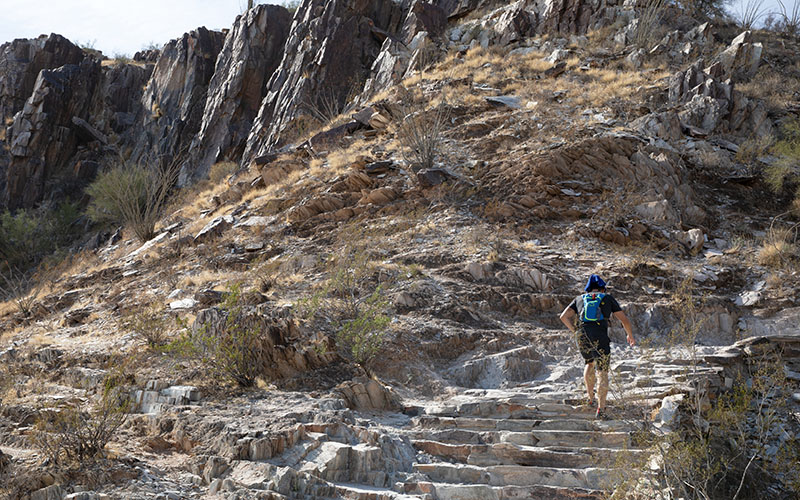PHOENIX – Ken Koshio has hiked Piestewa Peak every day for a year to perform a prayer at sunrise. The Japanese folk artist carries his taiko drum, flute and other instruments on his back.
“I tell people 100 pounds – (it’s) maybe 30, 40, I don’t know. But that’s not heavy,” said Koshio, whose performances gained something of a following each morning.
Hiking the 1.2-mile Summit Trail is hard even without extra weight. Near the top, the trail quickly turns steep, requiring hands and feet to clear the jagged rocks. When he first started doing this morning ritual, he said, the hike was grueling.
“But now every day, you know, it’s not heavy, but more like a balance,” said Koshio of Phoenix, who describes himself as a “global peace warrior” on his website.
Koshio specializes in taiko, an ancient Japanese drumming practice. He started a version of this ceremony at dawn each New Year’s Day in 2009 on Camelback Mountain. He has added instruments over the years, and started going more often. But when the pandemic hit, his in-person performances were canceled.
“So then I thought, ‘OK, I want to start (to do it as) a prayer every day. On top of that, you know, Piestewa.”
Koshio said Piestewa Peak was a natural place to go after the Cholla Trail on Camelback closed last year. In March 2020, a boulder came loose after some rain on the trail, forcing the closure, according to an article from 12News. Phoenix is restoring the trail.
Koshio said Piestewa Peak also was significant because of who it’s named for.
“And then also this mountain after the name of Lori Piestewa,” Koshio said. “Her memorial day was also March 23. So then, after that, every day, I’ve been doing this.”
Piestewa, an Army private from Tuba City, was the first Native American woman to die in combat as a member of the U.S. military. She was killed in March 2003 during the invasion of Iraq, and the peak was renamed in her honor the next month.
Koshio said this prayer and ceremony has allowed him to start his day grounded in his culture and spirituality.
Taiko, which means “drum” in Japanese, has been part of the culture for centuries and has been used in military, religious and cultural arenas, according to Stanford Taiko. The practice has evolved in North America.
Koshio’s daily ceremony captured the attention of other hikers, including Erez Kessler of Israel.
“We’re waiting for that every morning,” Kessler said. “I’m waiting to see my friends. … We like a small community of family, different languages. We all come in here to watch Ken and enjoy his spirit.”
Koshio said everyone who watched his 15-minute performance took time to reflect on their own ideals and beliefs.
“So, maybe what I’ve been doing inspired them to feel that so maybe that gives them some kind of feeling,” Koshio said.
That’s exactly what Marisa Ramella-Hicks said she thought when she first experienced Koshio’s performance. She said she started hiking the peak on April 28.
“That was the day my aunt was dying from COVID, and (to) take my mind off things, I came up,” she said, calling it a “fabulous experience. … We were all magnetized.”
Abhijit Ganguly of India has hiked Piestewa for the past 10 years. He describes himself as an early riser who hits the trail at 4:30 in the morning.
“And by the time I’m here, Ken is here,” Ganguly said. “And then we start. We have a great, great morning.”
Koshio said this daily ritual is all for his personal devotion. But those who watch him also take something from this ceremony.
“And sometimes,” Ramella-Hicks said, “it’s the whole song that just brings tears to my eyes, and sometimes I can just smile through the whole song and at the end, just tears – tears of joy, really – come to me.”
Koshio ended his daily ritual Tuesday, the 18th anniversary of Lori Piestewa’s death.

